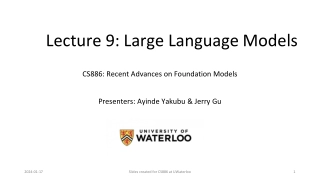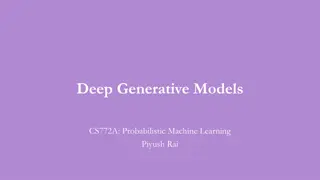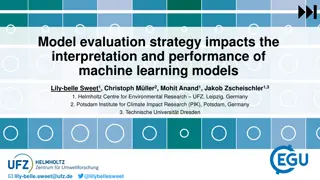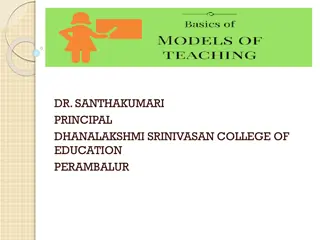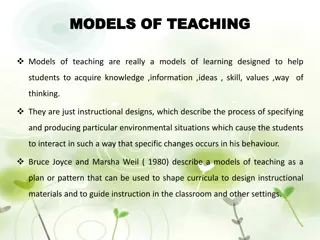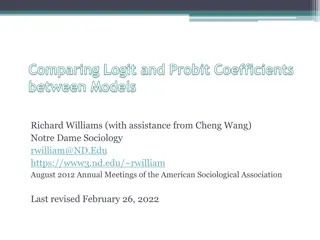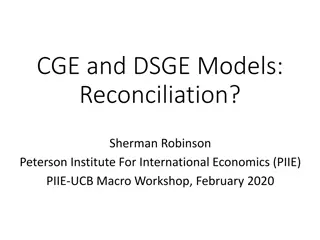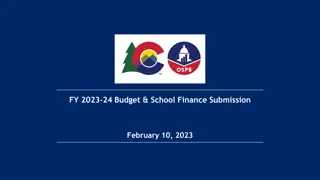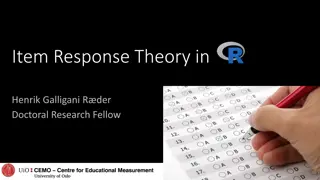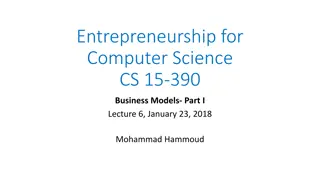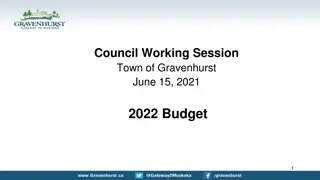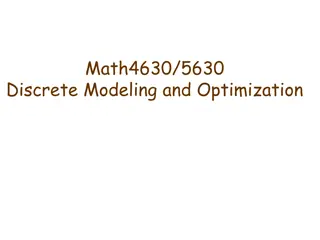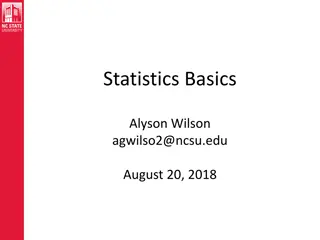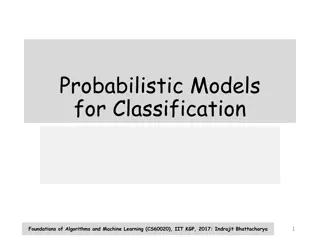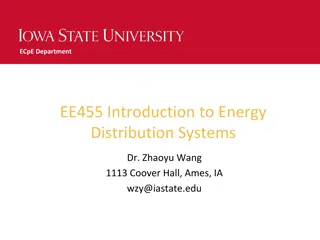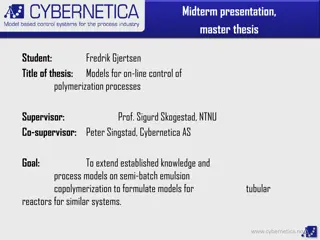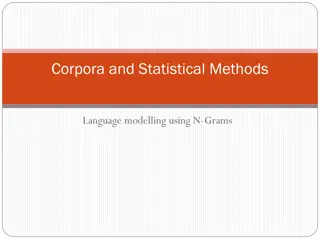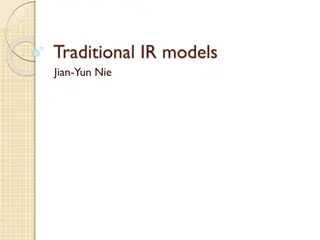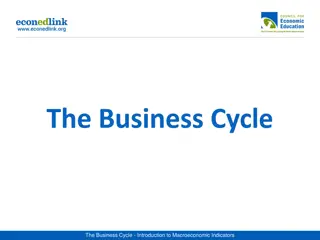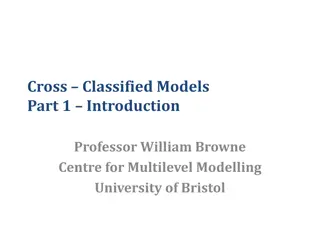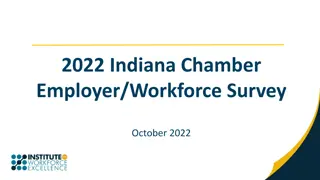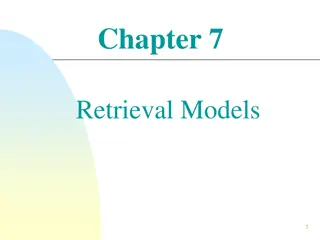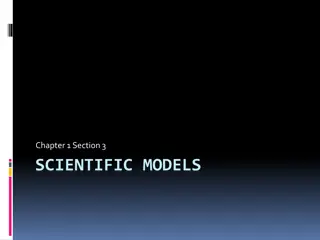City Revenue and Economic Forecast Update for Fiscal 2023
Council Finance projects a mild recession and weak recovery, with tax revenues exceeding OMB's forecast but constrained by inflationary pressures. Despite economic challenges, FY23 tax collections are higher, driven by strong consumer spending and real estate activity.
8 views • 5 slides
Recent Advances in Large Language Models: A Comprehensive Overview
Large Language Models (LLMs) are sophisticated deep learning algorithms capable of understanding and generating human language. These models, trained on massive datasets, excel at various natural language processing tasks such as sentiment analysis, text classification, natural language inference, s
2 views • 83 slides
Global Climate Models
Scientists simulate the climate system and project future scenarios by observing, measuring, and applying knowledge to computer models. These models represent Earth's surface and atmosphere using mathematical equations, which are converted to computer code. Supercomputers solve these equations to pr
3 views • 15 slides
System Models in Software Engineering: A Comprehensive Overview
System models play a crucial role in software engineering, aiding in understanding system functionality and communicating with customers. They include context models, behavioural models, data models, object models, and more, each offering unique perspectives on the system. Different types of system
2 views • 33 slides
Understanding Deep Generative Models in Probabilistic Machine Learning
This content explores various deep generative models such as Variational Autoencoders and Generative Adversarial Networks used in Probabilistic Machine Learning. It discusses the construction of generative models using neural networks and Gaussian processes, with a focus on techniques like VAEs and
9 views • 18 slides
Understanding Input-Output Models in Economics
Input-Output models, pioneered by Wassily Leontief, depict inter-industry relationships within an economy. These models analyze the dependencies between different sectors and have been utilized for studying agricultural production distribution, economic development planning, and impact analysis of i
8 views • 7 slides
Overview of Distributed Systems: Characteristics, Classification, Computation, Communication, and Fault Models
Characterizing Distributed Systems: Multiple autonomous computers with CPUs, memory, storage, and I/O paths, interconnected geographically, shared state, global invariants. Classifying Distributed Systems: Based on synchrony, communication medium, fault models like crash and Byzantine failures. Comp
9 views • 126 slides
Exploring Physical Geography Models and Theories
Engage in an active discussion concerning the teaching and learning of physical geography, focusing on various models, including the Bradshaw model. Learn about the importance and usage of models in physical geography education, their impact on student learning, and the essence of models in teaching
8 views • 22 slides
Model evaluation strategy impacts the interpretation and performance of machine learning models
The evaluation strategy used for machine learning models significantly impacts their interpretation and performance. This study explores different evaluation methods and their implications for understanding climate-crop dynamics using explainable machine learning approaches. The strategy involves tr
6 views • 16 slides
Understanding Models of Teaching in Education
Exploring different models of teaching, such as Carroll's model, Proctor's model, and others, that guide educational activities and environments. These models specify learning outcomes, environmental conditions, performance criteria, and more to shape effective teaching practices. Functions of teach
1 views • 20 slides
Understanding Models of Teaching for Effective Learning
Models of teaching serve as instructional designs to facilitate students in acquiring knowledge, skills, and values by creating specific learning environments. Bruce Joyce and Marsha Weil classified teaching models into four families: Information Processing Models, Personal Models, Social Interactio
1 views • 28 slides
Comparing Logit and Probit Coefficients between Models
Richard Williams, with assistance from Cheng Wang, discusses the comparison of logit and probit coefficients in regression models. The essence of estimating models with continuous independent variables is explored, emphasizing the impact of adding explanatory variables on explained and residual vari
1 views • 43 slides
Understanding Probability Rules and Models
Probability rules and models explain how to calculate the likelihood of different outcomes in a chance process by utilizing sample spaces, probability models, events, and basic rules of probability. Learn about the importance of sample space, probability models, calculating probabilities, mutually e
0 views • 17 slides
Significance of Models in Agricultural Geography
Models play a crucial role in various disciplines, including agricultural geography, by offering a simplified and hypothetical representation of complex phenomena. When used correctly, models help in understanding reality and empirical investigations, but misuse can lead to dangerous outcomes. Longm
0 views • 8 slides
Understanding CGE and DSGE Models: A Comparative Analysis
Explore the similarities between Computable General Equilibrium (CGE) models and Dynamic Stochastic General Equilibrium (DSGE) models, their equilibrium concepts, and the use of descriptive equilibria in empirical modeling. Learn how CGE and DSGE models simulate the operation of commodity and factor
4 views • 15 slides
Overview of Governor's FY 2023-24 Budget and School Finance Submission
The Governor's FY 2023-24 Budget focuses on maintaining fiscal sustainability by addressing caseload and inflationary pressures while emphasizing the importance of reserves and saving prepays. Significant investment is made in K12 education, with an average increase per pupil and a strategy to reduc
0 views • 10 slides
Enhancing Information Retrieval with Augmented Generation Models
Augmented generation models, such as REALM and RAG, integrate retrieval and generation tasks to improve information retrieval processes. These models leverage background knowledge and language models to enhance recall and candidate generation. REALM focuses on concatenation and retrieval operations,
1 views • 9 slides
Understanding Item Response Theory in Measurement Models
Item Response Theory (IRT) is a statistical measurement model used to describe the relationship between responses on a given item and the underlying trait being measured. It allows for indirectly measuring unobservable variables using indicators and provides advantages such as independent ability es
2 views • 32 slides
Exploring Business Models in Entrepreneurship for Computer Science
Today's lecture covered the fundamentals of business models in entrepreneurship, emphasizing the importance of value creation and value capture. It discussed various types of business models, including the Up-Front Charge Model and the Transaction Fee Model, highlighting their respective features an
0 views • 18 slides
Gravenhurst Town Council Working Session: 2022 Budget Overview
The Town of Gravenhurst's working session focused on reviewing the 2022 budget amidst the challenges posed by COVID-19. Discussions included the impact of inflationary pressures, assessment growth considerations, and support received from federal and provincial governments. The session highlighted t
0 views • 17 slides
Panel Stochastic Frontier Models with Endogeneity in Stata
Introducing xtsfkk, a new Stata command for fitting panel stochastic frontier models with endogeneity, offering better control for endogenous variables in the frontier and/or the inefficiency term in longitudinal settings compared to standard estimators. Learn about the significance of stochastic fr
0 views • 13 slides
Understanding Discrete Optimization in Mathematical Modeling
Discrete Optimization is a field of applied mathematics that uses techniques from combinatorics, graph theory, linear programming, and algorithms to solve optimization problems over discrete structures. This involves creating mathematical models, defining objective functions, decision variables, and
0 views • 12 slides
Understanding Basic Concepts in Statistics
This content covers fundamental concepts in statistics such as populations, samples, models, and probability distributions. It explains the differences between populations and samples, the importance of models in describing populations, and discusses various distributions like the normal and Poisson
0 views • 42 slides
Foundations of Probabilistic Models for Classification in Machine Learning
This content delves into the principles and applications of probabilistic models for binary classification problems, focusing on algorithms and machine learning concepts. It covers topics such as generative models, conditional probabilities, Gaussian distributions, and logistic functions in the cont
0 views • 32 slides
Understanding Energy Distribution System Line Models
This presentation delves into the various line models used in energy distribution systems, including exact line segment models and their derivation from Kirchhoff's voltage and current laws. The discussion covers three line segment models, the computation of phase impedance and admittance matrices,
0 views • 44 slides
Recent Developments in High Energy Physics and Cosmology
Recent developments in high energy physics and cosmology, including discussions on the BICEP2 results, classic inflationary models, alternative inflationary scenarios, multiverse implications, and contributions from researchers like Khoury, Ovrut, and Turok. The content covers various aspects of the
0 views • 24 slides
Observational Constraints on Viable f(R) Gravity Models Analysis
Investigating f(R) gravity models by extending the Einstein-Hilbert action with an arbitrary function f(R). Conditions for viable models include positive gravitational constants, stable cosmological perturbations, asymptotic behavior towards the ΛCDM model, stability of late-time de Sitter point, a
1 views • 12 slides
Understanding Wireless Propagation Models: Challenges and Applications
Wireless propagation models play a crucial role in characterizing the wireless channel and understanding how signals are affected by environmental conditions. This article explores the different propagation mechanisms like reflection, diffraction, and scattering, along with the challenges and applic
1 views • 14 slides
Trade Policies and Measures to Curb Inflationary Pressures in Rwanda
The presentation highlights the inflationary pressures faced in Rwanda, particularly in the food sector due to various factors such as the impact of the Ukraine-Russia war, fuel price increases, and supply chain disruptions. It discusses the causes of food inflation, price variations of basic commod
0 views • 12 slides
Models for On-line Control of Polymerization Processes: A Thesis Presentation
This presentation delves into developing models for on-line control of polymerization processes, focusing on reactors for similar systems. The work aims to extend existing knowledge on semi-batch emulsion copolymerization models, with a goal of formulating models for tubular reactors. Strategies, ba
0 views • 16 slides
Understanding N-Gram Models in Language Modelling
N-gram models play a crucial role in language modelling by predicting the next word in a sequence based on the probability of previous words. This technology is used in various applications such as word prediction, speech recognition, and spelling correction. By analyzing history and probabilities,
0 views • 101 slides
Understanding Information Retrieval Models and Processes
Delve into the world of information retrieval models with a focus on traditional approaches, main processes like indexing and retrieval, cases of one-term and multi-term queries, and the evolution of IR models from boolean to probabilistic and vector space models. Explore the concept of IR models, r
0 views • 65 slides
Understanding the Business Cycle in Macroeconomics
The business cycle refers to the fluctuations in an economy, with phases like peak, expansionary, trough, and contractionary. During expansionary phases, output increases, unemployment decreases, and inflation may rise. Conversely, contractionary phases see output decline, unemployment rise, and red
0 views • 6 slides
Understanding Cross-Classified Models in Multilevel Modelling
Cross-classified models in multilevel modelling involve non-hierarchical data structures where entities are classified within multiple categories. These models extend traditional nested multilevel models by accounting for complex relationships among data levels. Professor William Browne from the Uni
0 views • 13 slides
Insights from 2022 Indiana Chamber Employer Workforce Survey
The 15th annual Indiana Chamber Employer Workforce Survey presents findings based on 922 responses, highlighting workforce statistics, organizational types, future workforce projections, challenges faced, and strategies employed by Indiana businesses. Key insights include workforce size distribution
1 views • 43 slides
Understanding General Equilibrium Models and Social Accounting Matrices
General Equilibrium Models (CGE) and Social Accounting Matrices (SAM) provide a comprehensive framework for analyzing economies and policies. This analysis delves into how CGE models help simulate various economic scenarios and their link to SAM, which serves as a key data input for the models. The
0 views • 50 slides
Understanding Retrieval Models in Information Retrieval
Retrieval models play a crucial role in defining the search process, with various assumptions and ranking algorithms. Relevance, a complex concept, is central to these models, though subject to disagreement. An overview of different retrieval models like Boolean, Vector Space, and Probabilistic Mode
0 views • 56 slides
Understanding Scientific Models and Their Applications
Explore the world of scientific models through this informative content covering physical, mathematical, and conceptual models. Discover why models are used in science, their types, and potential limitations. Delve into the importance of utilizing models to comprehend complex concepts effectively.
0 views • 21 slides
Understanding Composite Models in Building Complex Systems
Composite models are essential in representing complex entities by combining different types of models, such as resource allocation, transport, and assembly models. Gluing these models together allows for a comprehensive representation of systems like the milk industry, where raw materials are trans
0 views • 27 slides
Coping with Inflation: Strategies for Small Businesses
Understanding and preparing for inflation is crucial for small businesses to maintain profitability and ensure survival. This article discusses the impact of inflation, provides strategies to cope with rising costs, and offers insights from a practical case study. By adjusting pricing, managing expe
0 views • 7 slides

